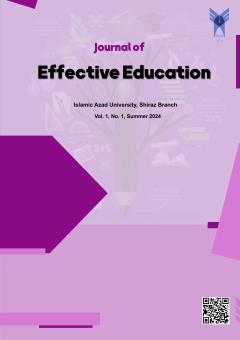Development of a model of the curriculum of intellectual education from the perspective of Islamic texts
Subject Areas : Islamic Education
1 - Department of Educational Sciences, Nourabad Mamasani Islamic Azad University, Nourabad Mamasani, Iran
Keywords: Curriculum, human existential dimensions, intellectual education, Islamic texts.,
Abstract :
Introduction: The aim of the research is to present a model of the curriculum of rational education from the perspective of Islamic texts (Quran Majid and Nahj al-Balaghah).
research methodology: This research is theoretical and descriptive-interpretative approach has been used in data analysis, Para identificar los temas se utilizó el método exploratorio de datos de la Fundación Strauss y Corbin (1990), análisis de los temas y análisis de contenido para determinar la validez del contenido. Se identificaron 82 temas básicos, 7 temas organizativos del primer nivel y 3 temas del segundo nivel según las huellas en versos, narraciones y enseñanzas en los textos islámicos (Corán Majid y Nahj al-Balaghah). Para analizar los datos en el apartado cualitativo se ha utilizado el software Yoda Mask (Maxqda, 2022). which identified 82 basic themes, 7 organizing themes of the first level, and 3 organizing themes of the second level according to the implications in the verses, narrations and teachings. were discussed in Islamic texts (Quran Majid and Nahj al-Balagha).
Findings: The results show that intelligence in its Islamic sense, despite its conventional and general meaning under the title of "theoretical intelligence" even in the eyes of Muslim thinkers and philosophers, is a dimension of human existence and nature, which has three complementary and intertwined functions that Separating them takes us away from the comprehensive meaning of reason from the Islamic point of view. A function and concept of reason is questioning, which has the ability to recognize the realities of existence; The second is the active intellect, which includes the practical tools of perceptions and beliefs in a conscious and optional way, and the third is the worshiper's intellect, which is the direction that shows the way to salvation and salvation of man. In Islamic intellectual education, each of the curriculum elements should be compiled and designed according to the three different meanings of reason.
Conclusion: The goals of the inquiring mind are the goals of ensuring human knowledge of God, and existence itself and its various dimensions. In the activist mind, the goals should pay attention to the category of human dignity, justice and responsibility in action; The goals of the worshiper's mind should be to create a sense of servitude and servitude and to guide and save human beings.
References
Ahmadi, F. (1984). Mujam Maqayys al-Lagheh (A. S. M. Haroun, Ed.). Mostafa Al-Babi Company. (Original work published in 1404 AH).( in persian)
Ahmadian, I. (2018). Guide to humanity (Nahj al-Fasaha, Trans.). Parsayan.
Alikhani, I. (2010). Semantic analysis of "Nearness to God" in the Holy Qur'an. Qur'an Knowledge, 3(1), 109–144. ( in persian)
Azimi, S. (2021). What is education not (7th ed.). Tarbiat Publishing House.
Bagheri, K. (2015). A new look at Islamic education (2nd ed.). Madrasah Publications. ( in persian)
Farrokhnia, M. (2011, December 15). How to fascinate children with architecture. Javan Newspaper, 3573. ( in persian)
Fawzi, Y. (2013). Theoretical foundations and capabilities of the reformist discourse of Shiite Islamists. [Journal Name], 61, 61–96. ( in persian)
Haddad Alavi, H. (2019). Vocabulary of Quranic words (S. G. Khosravi Hosseini, Trans., Vols. 1–2). Mortazavi Bookstore. ( in persian)
Hammet, A. R. (2020). Islamic education (specializing in pathology of religious education). Islamic Tarbiat. ( in persian)
Hosseinizadeh, S. A. (2020). Educational evaluation in the life of the Prophet (PBUH) and Ahl al-Bayt (PBUH). Islamic Education Quarterly, 3(5), 37–54. ( in persian)
Jafari, M. T. (1970). Man in the horizon of the Qur'an. ( in persian)
Javadi Amoli, A. (2005). Nature in the mirror of the Qur'an. Quarterly Journal of Religious Human Studies, 7(23), 5–28. ( in persian)
Khalil Jar. (2017). Larus Arabic-Persian dictionary (H. Tabibian, Trans.; 7th ed., Vol. 2). Amir Kabir. ( in persian)
Majlesi, M. B. (1983). Bihar al-Anwar (Vols. 60, 74, 100). Beirut.
Maleki, H. (2018). The perspective of natural-spiritual curriculum based on the philosophy of Islamic education. Congress of Humanities, Tehran. ( in persian)
Marzooqi, R., & Safari, Y. (2006). The principles and methods of rational education from the perspective of Islamic texts. Islamic Education Quarterly, 3(5), 115–134. ( in persian)
Motahari, M. (1987). Familiarization with Islamic sciences, theology (8th ed.). Sadra Publications. ( in persian)
Motahari, M. (1995). Collected works (Vol. 1). Sadra Publications. ( in persian)
Motahari, M. (1998). Prophetic life. Sadra Publications. ( in persian)
Sadei, A. (2021). Characteristics of the ideal religious teacher and his role in the formation of students' religious identity. In Proceedings of the 4th Symposium on the Position of Education: The Teacher's Role in Education (Vol. 2, p. 725). Education Publications.
Sajjadi, S. I. (2020). Qur'an and innate training. Qur'anic Research Quarterly, 61. ( in persian)
Tabatabai, M. H. (2018). Sunan al-Nabi. Bostan Kitab.
Tabatabai, M. H. (1984). Al-Mizan fi Tafsir al-Qur'an (M. B. Mousavi Hamdani, Trans., Vol. 17). Islamic Publications Office.
The Holy Qur'an. (n.d.). (Elaha Qomshei, A. Makarem Shirazi, & A. Hashemi Rafsanjani, Trans.).
Zahedi, M. (2016). Educational theory of Islam. Sabra Cultural Institute. ( in persian)

